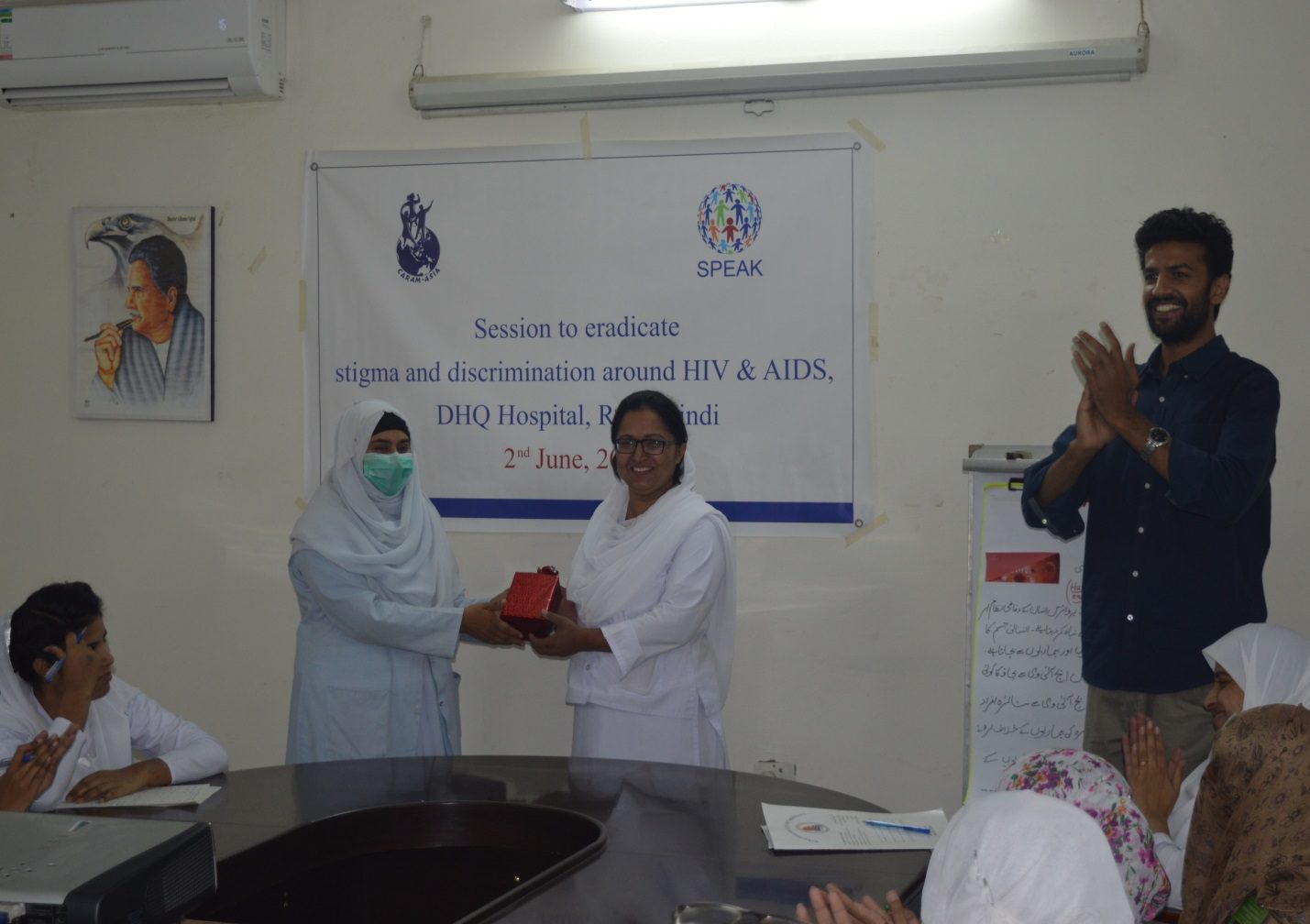CARAM Asia: Greater Recognition of Migrant Workers as a Key Population Affected by HIV
“We are now helping several governments in the region provide better information and support for their workers travelling overseas for work.”
Coordination of Action Research on AIDS and Mobility (CARAM Asia) is a dynamic regional Asia network of 42 civil society and migrant support organizations working with source and destination countries for migrant workers.
CARAM Asia was established in 1997 in Malaysia, and began working with the Robert Carr Fund in 2014. As well as supporting its core functions, RCF support has enabled CARAM to work intensively with its member organizations in Bangladesh, Cambodia, Pakistan, Philippines and Sri Lanka to ensure that migrant workers are able to access HIV information, prevention and care services.

Sensitization session of Hospital staff on eradicating Stigma and discrimination around HIV. © CARAM Asia
The support provided by RCF allows CARAM to work with member organizations facing challenges in remaining registered, as national governments change their policies and practices in relation to CSOs. In Pakistan, CARAM was able to assist in the re-establishment of a national network following deregistration of several advocacy CSOs by government. This allowed for the continuation of important work to gain recognition of migrant workers as a key population in HIV programming.
The CARAM HIV Prevention and Care Project across Bangladesh, Pakistan and Sri Lanka took several forms. The national member organizations in Bangladesh, Pakistan and Sri Lanka worked with implementers of HIV programs (community outreach workers and health workers) to have more awareness about how to reach and provide services for migrant workers.
- In Bangladesh: the project helped national member organizations engage with governments to modify their National HIV Policy to include migrant workers as a key or vulnerable population.
- In Pakistan: the project assisted national member organizations to work with the Ministry of Overseas Pakistanis and Human Resource Development, to take part in policy development for migrants, specifically on the HIV section with focus on HIV services for migrants, returnees and deported migrants. This is an improvement in recognition of migrants as one of key populations at risk of HIV. Additionally, the project assisted government agencies to modify the curriculum of orientation training for migrant workers to include more explicit information on HIV and sexual health.
- In Sri Lanka: CARAM Asia’s national member closely worked with VCCT and STI clinics. Resultantly, the clinics’ staff have realized that migrants are at high risk of contracting HIV while abroad, and have incorporated HIV prevention programs targeting migrants, and advocated with STI clinics in Colombo to provide HIV testing programs for returnee migrants. Due to advocacy as part of the RCF-funded project, migrant workers are recognised as vulnerable group for HIV in Sir Lanka.
As a result of this support, all three countries now formally recognize migrant workers in their National HIV Strategies. This is important, as these strategies drive program priorities and resource allocation. It also signifies that countries will begin to report on progress in HIV prevention and care in these populations. The assistance from RCF also resulted in significant improvements in migrant worker pre-departure orientation programs, not only in these countries, but also in other countries across the CARAM network. In most countries, orientation sessions were restricted to informing workers departing the country that they needed to be sure to obey their employer and abide by the destination country’s laws. However, with CARAM’s support, its members have been able to insert curriculum (and in some cases facilitate orientation sessions) on HIV, sexual health and rights into pre-departure programs. In the Philippines large number of officers from different bureaus of the Department of Foreign Affairs such as from Foreign Service Institute (DFA-FSI), Office of the Undersecretary for Migrant Workers Affairs (DFA-OUMWA), Office of Consular Affairs-Consular Information Centre (OCA-ICIC), Regional Consular Office in Butuan (RCO) were provided trainings to enhance their understanding on Gender, Sexuality and SOGIE concepts and to increase understanding of participants on the intersectionality of these concepts with HIV in the context of migration.
RCF funding allows CARAM to bring its member organizations together to work on issues of mutual interest and concern. Member organizations then draw on each other’s skills and experiences. Working on a single issue across multiple countries, as was the case for recognition of migrant workers as a key population, also increases advocacy effectiveness in the region.